No Ratings Gold For NBC’s Seoul Coverage
NEW YORK — NBC’s evening ratings for its Summer Olympics telecasts are running about 15% below what was promised to advertisers, even though last week’s coverage from Seoul topped the national audience estimates released Tuesday.
After a slow start, ratings rose toward the end of the first week of the Olympics, with Thursday’s telecast averaging a 21 rating (about 19 million homes) to rank as the week’s most-watched program. NBC’s other six nights of Olympic programming were right behind in positions 2 through 7.
Nevertheless, NBC said it already has begun “make-goods on a limited basis”--giving advertisers free air time on the Olympics and possibly other programs to compensate for lower-than-projected ratings for its Summer Games.
NBC’s action was praised by advertising agency executives such as Young & Rubicam executive vice president Paul Isaacson, who on Monday expressed disappointment in the Olympic ratings so far.
“I was hoping it would do better,” he said. Still, he added, “I have nothing but good things to say about NBC” for its swift make-good effort.
How much this action may cut into NBC’s anticipated profit from the Games won’t be known until after the Olympics close Sunday. The network had set aside some time for “make-goods” anyway, and the lower-than-expected ratings won’t put the NBC package in the red, network spokesman Curt Block said Tuesday: “We expect to turn a profit.”
About 80 sponsors had bought an estimated $550 million in commercial time on the Olympics from Seoul, South Korea, with NBC charging up to $330,000 for a 30-second ad in prime time.
The network, which paid $300 million for the Games, another $100 million in production costs, and $40 million for facilities, had guaranteed advertisers a 21.2 prime-time ratings average.
But since the start of Olympic competition on Sept. 17, the evening telecasts have averaged an 18 rating, according to NBC estimates. That would drop to 17.7 were the opening ceremonies of Sept. 16 included. (Each ratings point represents 904,000 homes, according to the A.C. Nielsen Co.)
If that wound up as the final average, it would mean that NBC’s telecasts were watched in about 4.7 million fewer homes each night than tuned in for ABC’s 1984 Summer Games telecasts from Los Angeles.
ABC that year had projected a 25 ratings average for its prime-time Olympics shows in late July and August, and emerged with a 23.9 (in that year, a Nielsen point represented 838,000 homes).
NBC and others in the industry had not expected the 1988 Olympics to do that well for a variety of reasons:
--Because of its fall start, these Olympics face stronger TV competition than did the 1984 Games, including baseball’s pennant races, the start of the football season and some first-run entertainment programming.
--The 14-hour time difference from Seoul.
--The absence of the American domination that marked the 1984 Games, which were boycotted by athletes from the Soviet Union and most Eastern Bloc countries in retaliation for the U.S. boycott of the 1980 Moscow Games.
Both Block and NBC research chief Bill Rubens noted that audience interest in the Games usually rises during the Olympics’ second week, when there is more gold-medal competition.
“We think it’s going to build,” Block said of the audience for this closing week of Olympics.
One neutral ad agency executive, Doug Fay of Hal Raney & Partners, agreed with this thesis. “It’s a pretty fair bet,” said Fay, whose company has no clients sponsoring NBC’s Olympics.
“It’s like saying, ‘The race is half over, but the horse runs better in the second half, so I’m not nervous until the end.’ ”
Young & Rubicam’s Isaacson thinks NBC’s Olympics coverage is suffering from the same ailments as ABC’s money-losing $309-million Winter Games from Calgary this year--”too many hours and too many commercials.”
“It was done to make the deal,” he said. “We’re looking at the last two bad deals.”
The criticism of too many commercials in NBC’s coverage echoes what was heard during ABC’s Winter Olympics, he said. But NBC, like ABC, is “running a lot because they’re trying to get back their money,” he noted.
To the extent that whatever American network buys the rights to the 1992 Summer Olympics can get the costs “back into line,” Isaacson said, this year’s lower ratings should not dissuade advertisers from paying premium prices to buy commercial time.
More to Read
The biggest entertainment stories
Get our big stories about Hollywood, film, television, music, arts, culture and more right in your inbox as soon as they publish.
You may occasionally receive promotional content from the Los Angeles Times.










